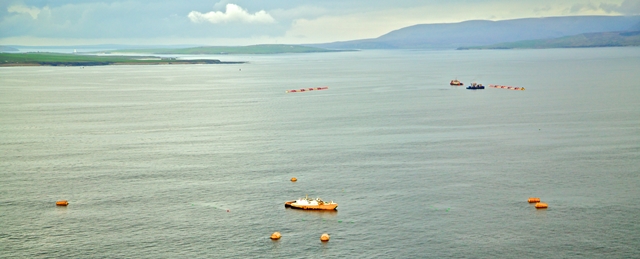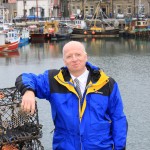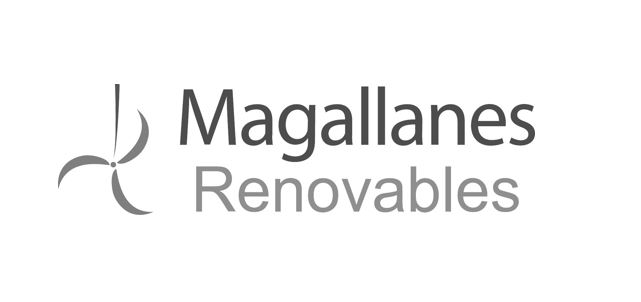Blog: The benefits of global collaboration
We’re often asked why we are supporting the development of wave and tidal test centres across the globe when they could be viewed as our competitors. With EMEC’s workshop for international open-water test centres just a week away, our Managing Director, Neil Kermode, addresses this frequently-asked-question in his latest blog:
- Neil Kermode, Managing Director, EMEC (Credit: Tom O’Brien)
Neil Kermode, Managing Director, EMEC
EMEC is frequently cited as the world leader in wave and tidal energy test centres, but around the globe a number of new test centres are currently being established in places as far afield as Canada and Japan, very often with the expert input of EMEC’s own team.
Why, some people ask, should the UK’s world-leading centre be sharing its expertise with what could be viewed as ‘competitor nations’?
One only has to travel overseas and attempt to plug in a computer to experience the answer. Every country established their own standards for plugs and sockets in isolation and the end result is pointless diversity of detail in the simple plugs throughout the world.
Marine energy devices are no different. In time, wave and tidal technologies will find their markets in dozens of countries and EMEC wants this to be as easy as possible both for the technology developers at EMEC and the ultimate customer here or overseas. We want a wave or tidal device which is certified at EMEC to be immediately marketable in any country, without expensive and time consuming re-validation.
The establishment of common global standards will be central to this. That is why, for more than a decade, EMEC has been at the very forefront of the development of international standards.
Critical to this, I believe, is the development of a standard approach to performance and resource assessment. If technologies invented in the UK and developed here at EMEC are to become established as global products, then it is vital that each international test centre uses the same common standards so investors can compare results from one centre with results at another.
We don’t see merit in standing by to watch each country develop its test infrastructure in isolation, without EMEC’s experienced input. We don’t see this as helping our competitors, rather we see it as building up a critical mass of international self-interest.
The establishment of a global network of test sites will, I believe, lead to a community of interest with common standards and approaches to the business of marine energy. Common standards, developed by worldwide experience, can only help accelerate the deployment of wave and tidal technologies.
Each country has its own unique conditions, both physical and political, and exploring these challenges simultaneously will enable marine energy technologies to colonise these optimum niches more rapidly than if tackled in isolation.
EMEC has also established itself as something of a shop window for the sector. More such windows will help spread the word about marine energy and that will assist in resolving one of the biggest stumbling blocks: Finance. Clearly the sector needs to attract further investment – and in this regard EMEC is perhaps the best sales tool this industry has had to date. What better way is there to market innovation and broker new multi-national involvement than set up demonstration sites in key market jurisdictions around the world, to let people see marine energy machines harnessing the energy from the sea?
Alongside technology development, we need to be able to assist policy makers. A tremendous technology is useless if there is nowhere to put it and, as our experience in Scotland has shown, policy has a central role to play in creating a marine energy market. Each country with marine resources will have to think about policy measures for seabed leasing, environmental impact assessment, grid infrastructure, grants and tariffs. Scotland’s experience and expertise in these areas is already being sought around the world and trade is being developed because of it. A global network of test centres, developed with EMEC input, will further help us sell that knowledge.
Canada, Japan, South Korea, Taiwan, Singapore, China, Chile, the USA and others are all in the business of establishing their own national infrastructures. I am proud to say EMEC has been the first port of call for the leadership teams establishing these new centres, and we have signed commercial memorandums of understanding with them to provide advice and consultancy services as they begin their own journeys.
So to turn the challenge back: what possible advantage would be created through isolation amongst test sites?
EMEC is an acknowledged world leader, but this does not mean we can stand still. Just as ten years ago we had to envision what a wave and tidal industry would look like a decade on; today we need to think how our sector might look in 2024 and beyond.
Scotland’s oil and gas industry gives an interesting parallel. Aberdeen is a global HQ for multinational businesses, but it is also underpinned by literally hundreds of small Scottish enterprises, all performing very specialised, expert roles. They all grew up and gained their experience in Scotland’s North Sea, but they now export their hard-won expertise around the world – all based on a strong home market and strong international links.
EMEC sees this as one possible scenario, but is not blind to other models emerging. What we do know is that there is business to be created from harvesting energy from the sea, that Scotland has led the way in marine energy and that the international opportunities presented by marine energy need to be grasped now.
If, as I believe, we can use these new worldwide test centres to foster market development, create common standards and sell Scottish expertise around the globe, then this has to be something our whole industry can support.

EMEC is working hard to create a network of open-water test centres across the globe, forming alliances with test facilities across the Americas, Asia, Australasia and Europe.
In 2013, EMEC welcomed delegates from existing and potential marine energy test centres around the world to Orkney and provided a non-stop itinerary showcasing the world-leading work taking place on the islands. The Global Ocean Energy Symposium was hailed a success with calls for continuing collaboration between international test centres. For further information visit: Global Ocean Energy Symposium
In collaboration with FORCE – Canada’s tidal energy test site based in Nova Scotia – EMEC is hosting a workshop for international open-water test centres following the International Conference on Ocean Energy (ICOE) 2014. For further information on the workshop, visit: International open-water test centres workshop






